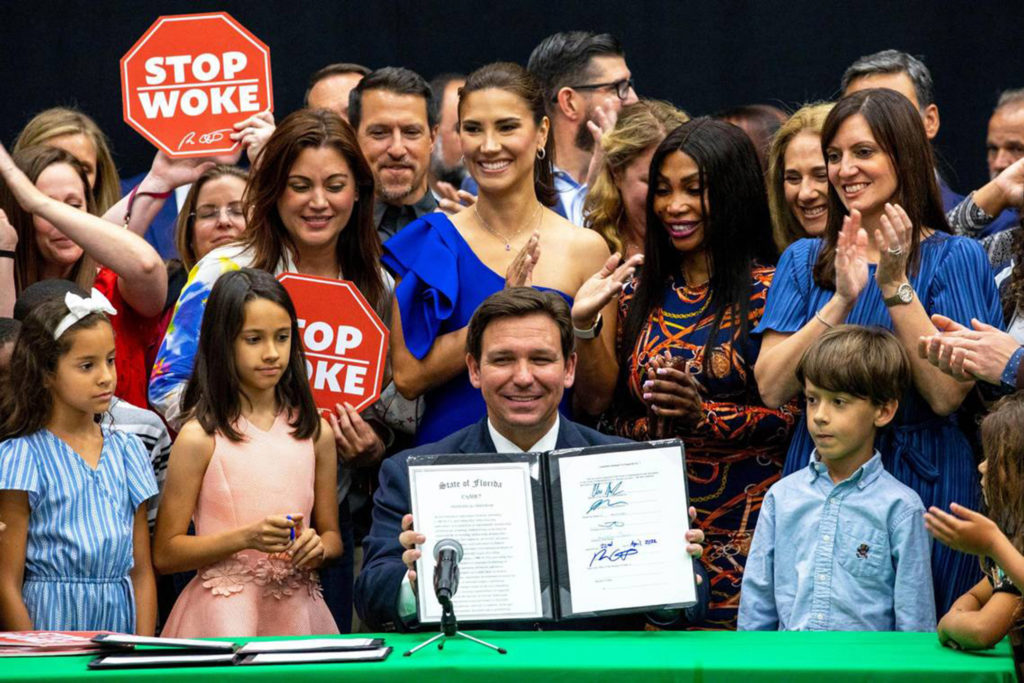States
Florida Enacts Legislation Restricting Diversity And Systemic Racism Education

Florida Enacts Legislation Restricting Diversity:
The state of Florida has passed the Stop WOKE Act, which limits the teaching of Critical Race Theory and white privilege in K-12 schools. Businesses are also subject to the regulation, which prohibits some diversity and inclusion training and carries a $10,000 fine.
This legislation has caused discussion and worry, notably in education. Educators worry about law enforcement and the absence of defined content guidelines. Teachers worry about punishments since the legislation gives leeway for interpretation, especially regarding student feelings like guilt or discomfort.
Governor Ron DeSantis, a Republican, is leading this legislative effort to combat “woke culture.” Governor DeSantis has raised transgender care and LGBTQ+ issue limits in education.
Ana Ceballos, The Miami Herald’s political reporter, explained Governor DeSantis’s intentional emphasis on themes that resonate with a large portion of the people. Florida is politically diverse and trending Republican; therefore, voters are divided. Some praise the governor’s attempts to restrict controversial teachings, while others worry about the possible limits on a complete education that covers crucial social problems.
Florida’s Controversial Law Restricts Racism And Critical Race Theory Discussions.
Florida’s controversial Stop WOKE Act, which bans talks of racism and Critical Race Theory (CRT) in school, has heightened cultural and political tensions. A fierce discussion has ensued about the state’s commitment to systemic racism and diversity as the law bans the teaching of white privilege in K-12 schools.
Black Student Academic Freedom Concerns
Concerns concerning academic freedom and Black students have arisen when the bill takes effect. Teachers and schools worry about being unable to explore historical settings and debate structural racism with pupils. This constraint has raised questions about the necessity of comprehending the Black community’s issues, particularly in a state where racial diversity shapes societal dynamics.
Stance And Impact Of Governor Desantis On Florida Black Communities
Governor Ron DeSantis has led the political machinations to battle “woke culture” in schools. Critics say the law may hurt Black pupils’ education by suppressing talks about their history and institutional impediments. The governor’s position has sparked arguments concerning political ideology and marginalized populations’ lived experiences, as well as the effects of such actions on Florida’s Black population.
Read Also: Florida’s New Law On Loud Music Enforcement Raises Concerns About Racial Bias
Florida Voters’ Diverse Views And Inclusivity Debates
This statute has also shown Florida voters’ diversity. Some applaud the move as a way to prevent harmful views from being taught, while others worry about its impact on comprehending the Black experience and US racial dynamics. As debates over the law’s enforcement continue, the state remains divided over how to address racism in schools, raising questions about the balance between academic freedom and a robust, inclusive curriculum for all students, especially marginalized ones.
Teacher Concerns And Challenges In The New Educational Landscape
The introduction of the Stop WOKE Act has presented educators with additional obstacles in teaching sensitive topics like racism and critical race theory. Many instructors recognize the necessity of knowing historical and present racial dynamics, but the new law’s legal restrictions make it difficult to comply. This has led to reevaluating educational methods and a quest for novel approaches to promote critical thinking and racial conversations within the regulatory framework. The law’s restrictions have raised worries about school quality and pupils’ grasp of complicated social problems.
Backlash And Civil Rights Group Advocacy For Academic Integrity
Civil rights organizations and supporters have raised worries about the new law’s impact on Florida schools’ academic integrity amid the intense discussions and controversies. These organizations emphasize an inclusive and comprehensive learning environment and have questioned the ramifications of limited systemic racism and historical injustice topics. Various groups have been increasingly vocal about guaranteeing that the state’s educational policies promote a broad understanding of viewpoints and a more equal and just society.
Impact On Future Generations And Education’s Social Equity Role
The Stop WOKE Act’s long-term effects on future generations’ viewpoints and understanding are becoming apparent. As arguments about race, power, and historical injustices grow more acrimonious, education is needed to promote social fairness and a better understanding of systemic racism. The present arguments emphasize the need to build a learning environment that promotes critical thinking, empathy, and a nuanced knowledge of oppressed cultures, especially Black communities. As Florida grapples with this contentious legislation, lawmakers, educators, and activists debate the role of education in creating a more inclusive and fair society.
The Lack Of Historical Context In Educational Discourse Related To Contemporary Racism
After the Stop WOKE Act was passed, concerns were voiced about the lack of historical context in educational discourse, especially addressing racism and its current expressions. The law’s prohibitions on Critical Race Theory and similar ideas have hindered educators’ capacity to educate pupils about institutional racism’s history. This absence has raised questions about how students understand racial dynamics and the persisting injustices experienced by vulnerable populations, notably Black people. Critics say knowing historical context fosters empathy, social awareness, and an educated response to systemic difficulties in modern society.
Intersectionality And Inclusive Education To End Systemic Racism
The Stop WOKE Act discussions have highlighted intersectionality and inclusive education as key to ending systematic racism. Advocates say an inclusive curriculum is necessary to recognize the interconnectedness of oppression and prejudice, particularly in the Black community. The law’s restrictions on critical race theory and similar themes have prompted worries about erasing intersectional views from educational settings, impeding education’s grasp of structural inequities’ complexity. This has led to a reevaluation of education’s role in social justice and equality, focusing on creating an inclusive learning environment that recognizes the unique experiences and contributions of all members of society.













You must be logged in to post a comment Login